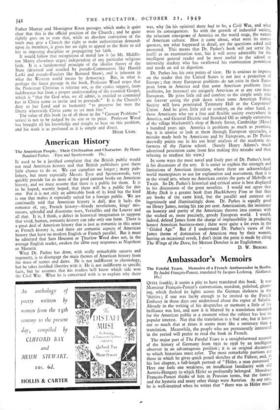American History
The American People : Their Civilisation and Character. By Henn Bamford Parkes. (Eyre and Spottiswoode 15s.)
Jr used to be a justified complaint that the British public would not read American history and that British publishers gave them little chance to do so. We can complain no longer ; many pub- lishers, but more especially Messrs. Eyre and Spottiswoode, very quickly provide for us most of the good current books on American history, and we must assume that there is a public for them. It is to be hoped, warmly hoped, that there will be a public for this one. For it is not only an admirable book of its kind but the kind is one that makes it especially suited for a foreign public. We are continually told that American history is dull, that it lacks the romance of, say, French history—bloody revolutions, kings' mis- tresses, splendid and disastrous wars, Versailles and the Louvre and all that. It is, I think, a defect in historical imagination to suppose that vivid, human, romantic history can take only one form. There is a great deal of American history that is just as romantic in this sense as French history is, and there are romantic aspects of American history that have no modern English or French parallel. But it must be admitted that Sam Houston or Thurlow Weed does not, in the average English reader, awaken the same easy responses as Napoleon or Mazarin.
What Dr. Parkes has done, with really remarkable success and ingenuity, is to disengage the main themes of American history from the mass of names and dates. He is not indifferent to chronology, but he takes justified liberties with it. He is not indifferent to specific facts, but he assumes that his readers 'will know which side won the Civil War. What he is concerned with is to explain why there was, why (in his opinion) there had to be, a Civil War, and what were its consequences. So with the growth of industrial society, the reluctant emergence of America on the world stage, the nature of American culture. How it came about, what were its conse- quences, not what happened in detail, are the questions asked and answered. This means that Dr. Parkes's book will not serve (by itself) as an examination text, but it will serve admirably for the intelligent general reader and be most useful to the school or university student who has swallowed his examination pemmican and needs an aid to digestion.
Dr. Parkes has his own points of view. He is anxious to impress on the reader that the United States is not just a protection of Europe ; that many European problems do not exist in their Euro- pean form in America and that some American problems (race problems, for instance) are uniquely American or at any rate non- European. He gives little aid and comfort to the simple souls who are forever seeing the pink dawn when some American Fabian Society will have penetrated Tammany Hall or the Carpenters' Union. And he gives little aid or comfort, on the other hand, to those Americans who see a free and flexible society everywhere in America, and General Electric and Standard Oil as simply extensions of the village blacksmith's shop of Brattle Street, Cambridge (Mass.) a hundred years ago. America is problems as much as promises, but it is unwise to look at them through European spectacles, a mistake made both by Americans and by Europeans, as Dr Parkes shrewdly points out in his too brief analysis of the academic re- formers of the Nation school. (Surely Henry Adams's much advertised pessimism came from first making this mistake and then refusing to readjust his view.)
In some ways the most novel and lively part of Dr. Parkes's book is his discussion of the arts. It is easier to explain the strength and limitations of American literature, where there are acknowledged world masterpieces to use for explanation and assessment, than it is in the visual arts, where no American carries the guns of Melville or Twain. So Dr. Parkes's historical and critical sense is best displayed in his discussions of the great novelists. I would not agree that Moby Dick is a greater book than Huckleberry Finn or that they are books of the same kind, but the parallel and contrast are ingeniously and illuminatingly done. Dr. Parkes is equally good on Henry James, noting his zoo per cent. Americanism, the insistence on honesty and purity of the Americans thrown into contact with the wicked or, more precisely, greedy European world. I would, indeed, defend James from the charge of implausibility in producing honest American business-men ; there were quite a lot even in the "Gilded Age." But if I understand Dr. Parkes's views of the James theme of domination of American men by their women, barring an occasional revolt, I don't think the point is made by citing The Wings of the Dove, for Merton Densher is an Englishman.
D. W. BROGAN.


































 Previous page
Previous page